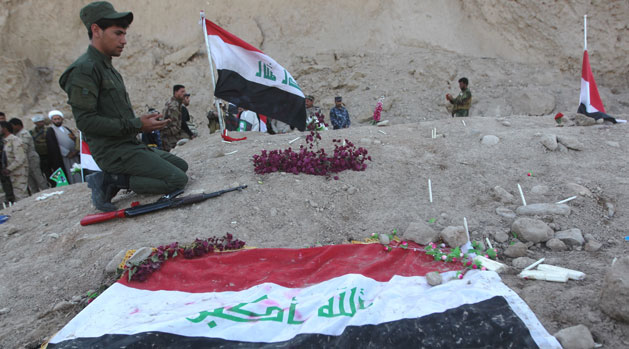Camp Speicher massacre: mass graves excavated in Iraqi city of Tikrit
'Heartbreaking scenes' as the bodies of up to 1,700 Iraqi soldiers executed by Islamic State were discovered

A free daily email with the biggest news stories of the day – and the best features from TheWeek.com
You are now subscribed
Your newsletter sign-up was successful
Mass graves thought to hold the bodies of up to 1,700 Iraqi soldiers killed by Islamic State (IS) militants have been discovered in the newly liberated city of Tikrit.
Forensic teams have been excavating 12 grave sites near the former US Army base, Camp Speicher. A small ceremony was held on the hillside to honour the fallen soldiers, with soldiers firing rounds of gunfire into the air as the national anthem played, CNN reports.
"We dug up the first mass grave site today,” Khalid al-Atbi, an Iraqi health official working with the forensic team, told Reuters. “Until now, we found at least 20 bodies. Initial indications show indisputably that they were from the Speicher victims.
The Week
Escape your echo chamber. Get the facts behind the news, plus analysis from multiple perspectives.

Sign up for The Week's Free Newsletters
From our morning news briefing to a weekly Good News Newsletter, get the best of The Week delivered directly to your inbox.
From our morning news briefing to a weekly Good News Newsletter, get the best of The Week delivered directly to your inbox.
"It was a heartbreaking scene. We couldn't prevent ourselves from breaking down in tears. What savage barbarian could kill 1,700 persons in cold blood?"
The Camp Speicher massacre took place in June last year, when IS militants led hundreds of unarmed Iraqi soldiers off the army base and executed them. Survivors say the militants questioned the victims to identify those who were Shia Muslims, before murdering them. Gruesome video and images of the attacks were later posted online.
“The massacre of the Iraqi army detachment at Camp Speicher was unprecedented even by the standards of Iraq's decade of sectarian war,” says Reuters. Families of the victims have laid blame on the government and local tribes, who they accuse of promising the soldiers safe passage, but then allowing them to be led to their deaths.
The remains from the mass graves will be sent for DNA testing, but officials warn it could take months for all of the bodies to be uncovered and identified.
A free daily email with the biggest news stories of the day – and the best features from TheWeek.com
“The murder of the soldiers has become a lightning rod for Shia militias who have vowed to avenge the killings,” reports the BBC. The militias have helped Iraqi forces push back IS advances, but have themselves been accused of war crimes.
Iraqi soldiers and Shiite militias recaptured Tikrit from IS militants last week after a month of fierce fighting, representing a significant victory for the Iraqi government.
The army is now preparing to retake Mosul, Iraq's second biggest city and IS stronghold. The operation is reported to involve 25,000 Iraqi forces and will be backed by US-led coalition air strikes.
-
 Quiz of The Week: 14 – 20 February
Quiz of The Week: 14 – 20 FebruaryQuiz Have you been paying attention to The Week’s news?
-
 The Week Unwrapped: Do the Freemasons have too much sway in the police force?
The Week Unwrapped: Do the Freemasons have too much sway in the police force?Podcast Plus, what does the growing popularity of prediction markets mean for the future? And why are UK film and TV workers struggling?
-
 Properties of the week: pretty thatched cottages
Properties of the week: pretty thatched cottagesThe Week Recommends Featuring homes in West Sussex, Dorset and Suffolk
-
 Epstein files topple law CEO, roil UK government
Epstein files topple law CEO, roil UK governmentSpeed Read Peter Mandelson, Britain’s former ambassador to the US, is caught up in the scandal
-
 Iran and US prepare to meet after skirmishes
Iran and US prepare to meet after skirmishesSpeed Read The incident comes amid heightened tensions in the Middle East
-
 Israel retrieves final hostage’s body from Gaza
Israel retrieves final hostage’s body from GazaSpeed Read The 24-year-old police officer was killed during the initial Hamas attack
-
 China’s Xi targets top general in growing purge
China’s Xi targets top general in growing purgeSpeed Read Zhang Youxia is being investigated over ‘grave violations’ of the law
-
 Panama and Canada are negotiating over a crucial copper mine
Panama and Canada are negotiating over a crucial copper mineIn the Spotlight Panama is set to make a final decision on the mine this summer
-
 Why Greenland’s natural resources are nearly impossible to mine
Why Greenland’s natural resources are nearly impossible to mineThe Explainer The country’s natural landscape makes the task extremely difficult
-
 Iran cuts internet as protests escalate
Iran cuts internet as protests escalateSpeed Reada Government buildings across the country have been set on fire
-
 US nabs ‘shadow’ tanker claimed by Russia
US nabs ‘shadow’ tanker claimed by RussiaSpeed Read The ship was one of two vessels seized by the US military